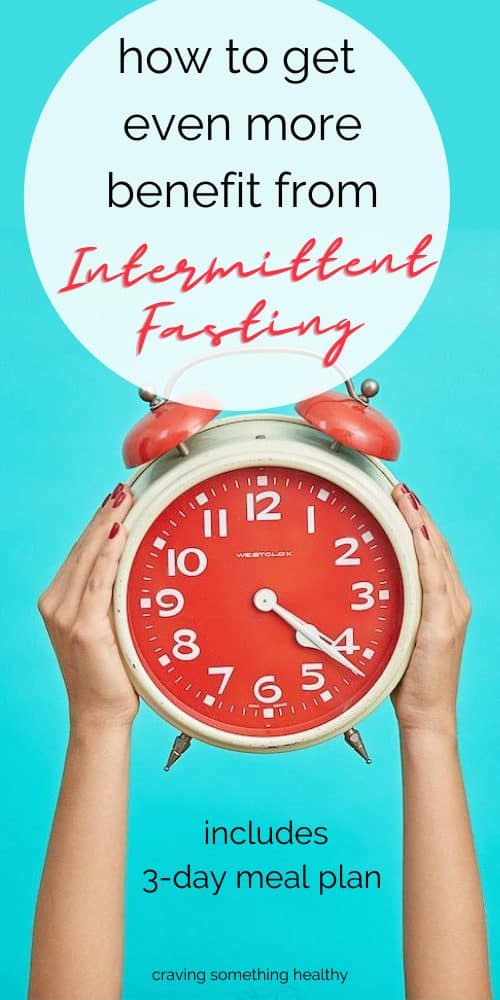Intermittent Fasting: How to Get More Benefit for Weight Loss and Health
Want to get the most bang for your buck from healthy eating? Combine intermittent fasting with the Mediterranean diet. Both have benefits for your health, and when used together, you might see more weight loss and improvements in blood sugar, cholesterol, and blood pressure.
With all of the press that both the Mediterranean diet and intermittent fasting have been getting recently, you would think they’re both hot new weight loss diet trends. In fact, both of these diet patterns have been around for thousands of years. It’s only recently, that scientists have explored their health benefits that range from diabetes and cancer prevention to anti-aging effects.
What is Intermittent Fasting?
The Mediterranean diet has been promoted as a healthy way of eating for quite a while, so you’re probably familiar with its focus on olive oil, fish, and lots of plant foods. Intermittent fasting, however, is a newer concept to many. It’s also known known as time restricted eating. Some people may refer to it as the circadian rhythm diet.
Whatever you call it, it’s based on the premise that your body functions best when you eat only within a certain time span – usually within an 8-hour time period that’s during daylight hours.
Much like the Mediterranean diet, it’s not really a diet, in that there are things to eat or eliminate. With intermittent fasting, instead of counting calories or carbs or anything related to food – you eat according to your body’s clock.
That might sound like a crazy concept until you think about religious fasting. People have been fasting for religious reasons for ages. Medical professionals have noticed that fasting brings about certain short-term health benefits like weight loss, and improvements in blood sugar and blood pressure. At the cellular level, it also helps reduce inflammation, which can in-turn, may result in less pain from arthritis to reduced cancer risk.
There are some interesting health benefits to be gained from intermittent fasting, especially for those of us who are getting older and at risk for age-related chronic diseases. Interestingly, the benefits here are similar to those of the Mediterranean diet – so it makes sense to combine them.
How to Do It
If you’re sick and tired of restrictive diets to lose weight, you might very well benefit from both intermittent fasting and the Mediterranean diet. They’re both less of a diet, and more of an eating pattern.
With intermittent fasting, you cycle between periods of eating, and then fasting. That means, technically, you can eat whatever you like, as long as you do it within your allotted eating time, and then fast for the remainder of the time.
Of course, I always qualify that to say, “eat anything you want, within reason.”
If you eat a healthy diet like the Mediterranean diet, AND you combine it with fasting, it’s a win-win situation. You’ll get the health benefits of the Mediterranean diet foods, along with the metabolic benefits of intermittent fasting.

There are a few different ways to do intermittent fasting:
- The 5:2 method – Here you eat your regular diet five days each week, and then on two non-consecutive days, you do a mini-fast and eat/drink only 300-500 calories.
- The True Fast method – You do a complete fast with no calories (only water, teas, black coffee) once each week.
- The 16:8 method – For many people, this is the easiest fasting method to follow, because you can eat normally every day. You eat your meals within an 8-hour window, and then fast for the other 16 hours.
The 16:8 method works well because it just means eating a later breakfast and an earlier dinner. Depending on your work schedule and personal commitments, it’s fairly do-able once you get in the habit.
Intermittent fasting is most challenging if you have to be at work super early or very late and you don’t have control over mealtime. Or, if you have a lot of evening social events. However, if your eating schedule is flexible – and especially if you’re working at home right now, and limiting social events because of COVID-19, it might be a good time to give it a try.
A 3-Day Mediterranean Diet-Intermittent Fasting Meal Plan
Again, there are no strict food rules on an intermittent fasting diet. However, I always recommend eating whole vs processed foods, and a plant-forward diet that includes lots of fruits, vegetables, whole grains, nuts, and seeds every day. Use olive oil, avocado, and even olives for some healthy fat. Make sure you eat some protein at each meal too – it helps fill you and keep you more satisfied.
The Mediterranean diet is an ideal eating pattern for its focus on whole foods that provide lots of health benefits. It’s also filling and satisfying, so it works perfectly with intermittent fasting. If you need help getting started with the Mediterranean diet, check out my cookbook – The Mediterranean Diet for Two.
And the nice thing about this way of eating is the flexibility. If you slip up or just want to go out for dinner occasionally and fast for 12 hours instead of 16, don’t stress about it. Aim for a 16 hour fast as often as possible, (that means no early morning lattes) but you’ll likely still see benefits from fasting at least 12 hours.
Here’s a 3-day meal plan (with links to some recipes) so you can see what a typical day might look like when you combine the two diets:
| Day 1 | Day 2 | Day 3 | |
| early am | Plain herbal or regular tea | Black coffee | Water with lemon or a teaspoon of apple cider vinegar |
| 10am | Oatmeal with berries, nuts, Greek yogurt | Vegetable omelet with whole-wheat toast and fruit | A blueberry spinach smoothie with almond butter and a scoop of protein powder |
| 1pm | Mushroom barley soup and salad | Turkey, hummus, and vegetable wrap | Warm spinach salad |
| 3pm | Grapes and almonds | Raw vegetables with guacamole | Apple with peanut butter |
| 6pm | Caprese stuffed portobello mushrooms; raspberries with coconut | Chicken, berry, and brown rice bowl | Tomato and goat cheese frittata and a cup of berries with Greek yogurt |
Why Intermittent Fasting Works
You’re probably thinking, some aspects of intermittent fasting run counter to everything you’ve been taught about healthy eating. Such as, breakfast is the most important meal of the day.
But other things make perfect sense. If you reign in your eating hours, and don’t eat after dinner, you’ll more than likely eat fewer calories. Personally, I think the advice to not eat after dinner is worth its weight in gold. So, even if that’s all you do, I promise you’ll get some benefit from this way of eating.
You might also get more sleep if you’re not eating late at night. And better sleep is associated with a healthier weight.
You see, humans really aren’t designed to be eating late at night or grazing from the time we wake up until the time we go to sleep – and definitely not in the middle of the night. Although eating is necessary, every time you eat, it actually causes stress in your body.
When you fast, your cells have a chance to repair themselves, and inflammation to improve. That affects many parts of your health.
- Most studies show that fasting helps insulin to work better, which improves blood sugar levels and also reduces the risk of some types of cancer.
- Many studies show it improves blood sugar.
- Some animal studies also show fasting improves the health of their gut microbiome – and that affects everything from weight, to immunity.
- In studies on animals fasting often extends their lifespan.
- Recent studies show it can be helpful for weight loss. However, it’s equally effective as just reducing your calories.
Still, it’s important to note that results in people aren’t always consistent. Scientists use animals to try and figure out exactly how fasting works, but thus far, they really aren’t sure why intermittent fasting shows some of these health benefits
Who Shouldn’t Try It?
The Mediterranean diet is safe and effective for everyone! And for the most part, intermittent fasting is also considered safe. However, if you take insulin or other medications to lower your blood sugar you shouldn’t do an extended fast. You could end up with hypoglycemia.
You may want to shorten your fasting period also, if you’re pregnant or breastfeeding – you need a steady supply of quality calories throughout the day and into the evening.
Also, I don’t recommend intermittent fasting for anyone with an eating disorder because it can up the risk of binge eating.
The Bottom Line
Both the Mediterranean diet and intermittent fasting are eating patterns that may improve your health. While the benefits of the Mediterranean diet are well researched, there's still much we don't know about fasting, including how and why it works.
I really like both of these ways of eating. However, I always stress that there is no one-size-fits-all diet and not everyone achieves the same results. Give each of them a try, and see if combining them works for you.
Eat well!

